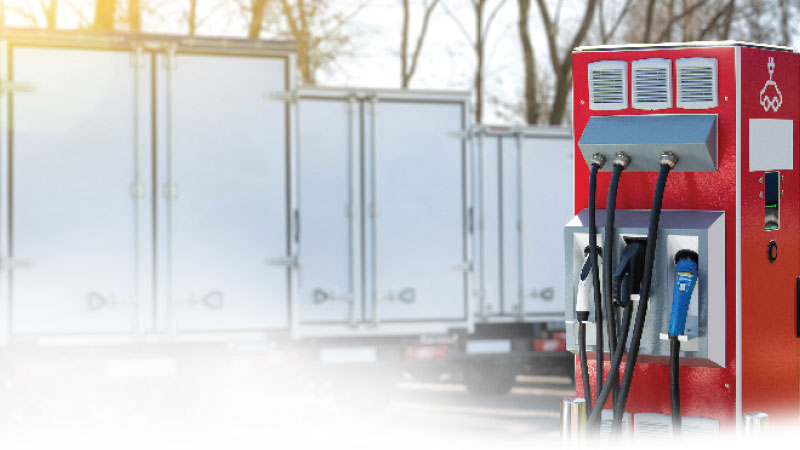Some fleet owners are driven by the volatile cost of gas and diesel or looking to get their business on the road to zero emissions, but there are many more unexpected reasons to consider a fleet electrification project in 2023.
1. Make use of government incentives to go electric
Generous incentives for purchasing zero-emission vehicles and installing charging infrastructure are available across Canada, with federal programs stacking on top of provincial funding in many cases. A new Deloitte report estimates that “approximately $3 billion is available for fleet electrification in Canada between now and 2027 under the federal government’s 2030 Emissions Reduction Plan.” However, as the market adoption of electric vehicles (Evs) increases, these incentives may not be here forever.
In the UK, where electric passenger car sales increased by 186% in 2020, incentives to purchase EVs have steadily declined until being stopped completely in June of 2022. That trend is not isolated to the UK. China has been cutting purchase support since 2018, and Quebec reduced its EV incentives by $1,000 for new vehicles in 2022.
New medium- and heavy-duty EV trucks are also eligible for provincial incentives in both BC and Quebec. Why wait?
2. A more reliable fleet more time on the road
Despite their higher up-front cost, EVs require less annual maintenance and result in fewer breakdowns and repair-shop headaches than conventional cars and trucks. EV truck operators also say they start more reliably in harsh winter conditions than their diesel cousins.
Because an EV motor has few moving parts and the vehicles require fewer maintenance check-ups like oil changes, EVs spend less time in the shop, and more time on the road. Generally, fleets can anticipate saving 30%-40% on electric versus combustion vehicle maintenance costs.
3.Boost driver safety and retention
One of the lesser-known upsides of fleet electrification is the benefit for drivers. EVs are quieter and enable one-pedal driving, since releasing the gas pedal engages regenerative braking that not only slows the vehicle, but recharges the battery in the process. Fleet EV drivers report less fatigue compared to driving a conventional vehicle.
EVs are proven to lead to large air pollution benefits, and reduce one’s exposure to harmful pollutants such as diesel (which can cause respiratory conditions like asthma), fine particulate matter and carbon dioxide.
All of this is healthier for drivers and, once they have driven an EV at work, they are less likely to go back to the old way.
4.Start your skills upgrade now
Electrification is coming, and fleet directors need to anticipate the transition from gas- or diesel-powered vehicles to electric. A US study from RMI found that although fleet managers are expecting the adoption of electric vehicles, there are few organizations that are ready to make the transition and understand the costs of owning and operating an electric fleet. From charging stations to sustainability benefits, business leaders will need to be ahead of the curve on what electrification could mean for their operations and their customers.
5.Be a brand differentiator
By 2026, one in five vehicles sold in Canada will be electric, based on the federal sales mandate. While this applies to light-duty cars, it may have a knock-on effect on consumer expectations: brands that continue to operate polluting vehicles will be more visible. Taking steps towards implementing electric vehicles now allows a business to concretely show its net-zero actions. Take Ikea Canada, for example: trucks emblazoned with phrases like “100% Electric,” which recently began operating last-mile deliveries in Montreal, Toronto and Vancouver, are rolling billboards for the retailer’s sustainability goals and commitment to an electric future.
6.Outpace future legislation
The politics of carbon-emitting vehicles are evolving and electrification could become a requirement for access to contracts or the right to operate in certain jurisdictions in the not-so-distant future.
For example, Montreal has pledged to implement a low-emissions zone in its downtown core by 2030. The federal government already moved up its mandate by five years to 2035 (for all light-duty vehicle sales). In order to comply with changing regulations, organizations have to consider how they will conduct operations going forward.
7.Help fight climate change
We have already seen the impacts of a changing climate in Canada, from heat domes, wildfires, flooding, rising sea levels and melting glaciers. There will continue to be serious economic and humanitarian impacts as a result of climate change.
The transportation sector is responsible for 27% of greenhouse gas emissions in Canada – with cars, vans, and light-duty trucks responsible for nearly half of that total. As a society, it is paramount for business leaders to show community leadership and take initiative to stop defaulting to fossil-fuel-driven vehicles and make the switch to electric.
The business case for owning and operating electric cars, vans and trucks is only growing stronger, so take the next step: sign up for Electric Autonomy’s free digital EV Fleets course, at evfleets.ca, to learn more about how to electrify your fleet, meet trusted suppliers, and glean best practices from industry experts.
Transitioning to zero-emissions vehicles may be one of the biggest challenges that businesses and governments will face in the coming years. Get your organization ready for the EV transformation by learning about the hardware, technology and funding supports available to you all in one place at the EV & Charging Expo on May 17-18 at the Enercare Centre in Toronto.
You will also have the chance to test-drive commercial EVs and attend workshops on everything from installing charging to fleet electrification. Learn more and register at evandchargingexpo.com.



